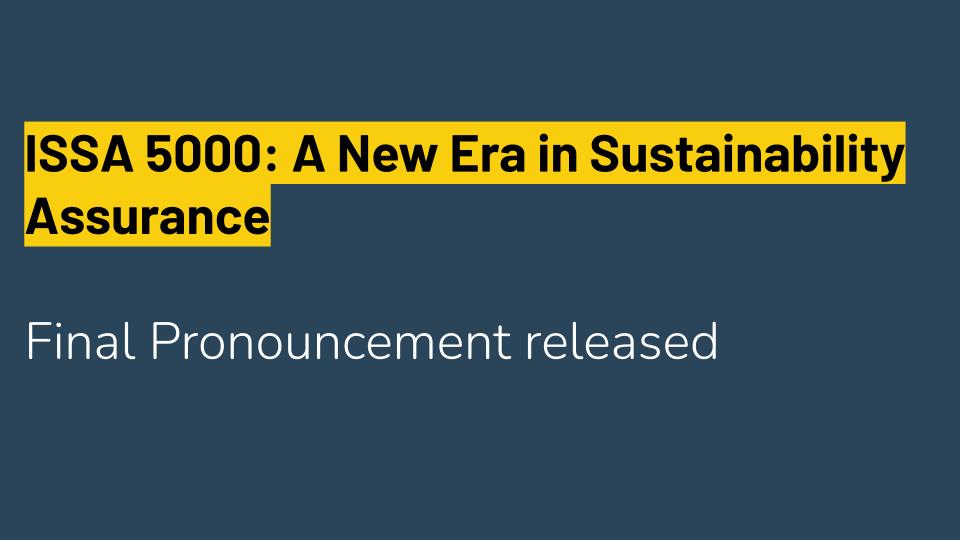Introduction
In our previous blog post, we discussed the International Auditing and Assurance Standards Board’s (IAASB) approval of the International Standard on Sustainability Assurance (ISSA) 5000. Now, with the final ISSA 5000 pronouncement officially released on November 12, 2024, the landscape for sustainability assurance has taken a definitive step forward. In this post, we’ll delve deeper into the key high-level points of ISSA 5000 and explore how it aims to strengthen public confidence in sustainability reporting.

Highlights of ISSA 5000
The International Standard on Sustainability Assurance (ISSA) 5000 outlines the general requirements for conducting sustainability assurance engagements. The key highlights of the document are:
- Scope and Applicability: ISSA 5000 applies to all sustainability assurance engagements, regardless of the format or type of sustainability information presented. It addresses both limited and reasonable assurance levels.
- Framework and Standards: ISSA 5000 is an overarching standard for sustainability assurance, eliminating the need for ISAE 3000 (Revised) when applied. The document emphasizes compatibility with the International Ethics Standards Board for Accountants (IESBA) Code for ethical requirements, including independence.
- Objectives: The standard aims to help practitioners obtain either reasonable or limited assurance on sustainability information, ensuring it’s free from material misstatements, and to issue a formal report that expresses their conclusion.
- Engagement Quality: Key requirements include the need for firms to implement quality management, apply ethical and professional standards, maintain objectivity, and utilize appropriate resources throughout the engagement.
- Documentation and Communication: Documentation requirements are strict, ensuring sufficient evidence and transparency in the assurance process. Additionally, communication with management and governance structures is mandated to address significant issues.
- Risk Assessment and Evidence Gathering: Practitioners are required to conduct thorough risk assessments, especially for material misstatements, and design targeted procedures to gather sufficient evidence to support their conclusions.
- Effective Date: The standard will be effective for engagements covering periods beginning on or after December 15, 2026, but early adoption is permitted.
Got questions about ESG or sustainability?
Book a free and nonbinding discovery call to discuss your questions with one of our sustainability experts, and learn how we can help you.
Conclusion
ISSA 5000 represents a significant milestone in the evolution of sustainability assurance. By providing a clear and comprehensive framework, it empowers practitioners to deliver high-quality assurance engagements that meet the growing demands of stakeholders for transparency and accountability. The standard not only harmonizes practices across different jurisdictions but also reinforces the importance of ethical considerations, risk assessment, and effective communication throughout the assurance process. As we move closer to its effective date on December 15, 2026, organizations and practitioners alike should familiarize themselves with ISSA 5000 to ensure a smooth transition and to continue building trust in sustainability reporting.
Download the ISSA 5000 final pronouncement here.
About NordESG
NordESG is an advisory firm helping corporates develop, articulate and execute their ESG and sustainability strategies. Our work includes sustainability performance reporting support under various ESG frameworks, strategy development or conducting materiality assessments. By doing so, we help businesses meet their disclosure compliance requirements like CSRD but also help them proactively communicate their strategy to other stakeholders like investors, customers and local communities in which they operate. Our work is focused mainly on Europe and North America.
Discovery Call
Book a free discovery call below
Get in touch via email
Disclaimer
This communication is marketing material. The views and opinions contained herein are those of the author(s) on this page, and may not necessarily represent the views expressed or reflected in other NordESG communications or strategies.
This material is intended to be for information purposes only. It is not intended to provide and should not be relied on for accounting, legal or tax advice, or investment recommendations. Reliance should not be placed on the views and information in this document when taking individual investment and/or strategic decisions. Information herein is believed to be reliable, but NordESG does not warrant its completeness or accuracy.
Some information quoted was obtained from external sources NordESG consider to be reliable. No responsibility can be accepted for errors of fact obtained from third parties, and data and information contained in this communication may change in the future. The views and opinions expressed in this communication may change.